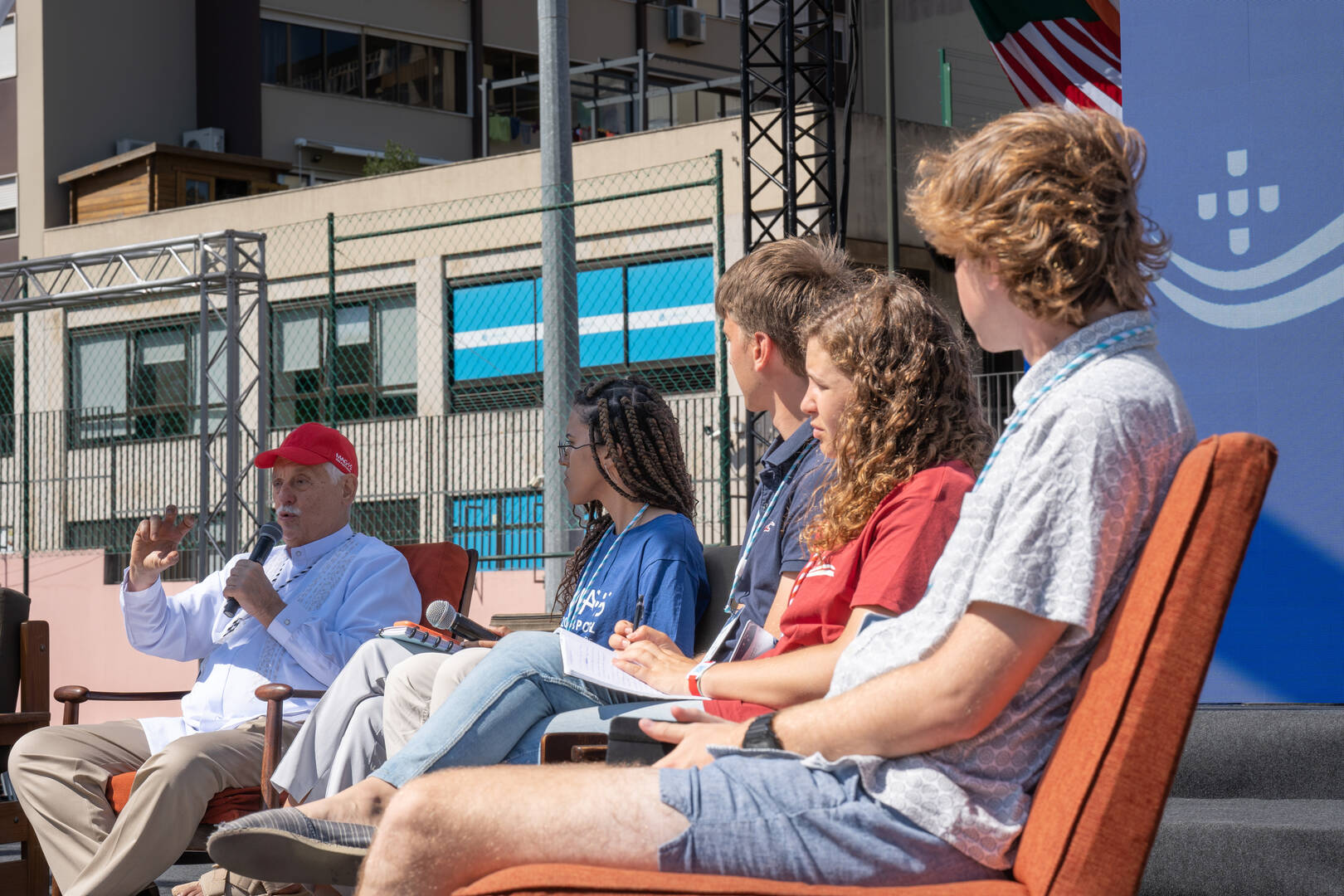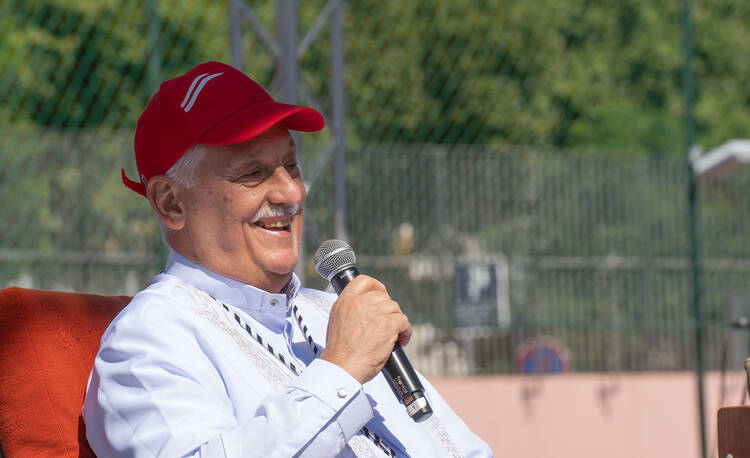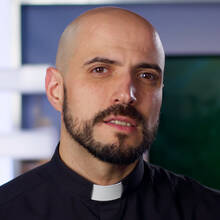On the feast of St. Ignatius Loyola, the founder of the Society of Jesus, Arturo Sosa, S.J, the superior general of the order, had a candid, live-streamed conversation with six young pilgrims representing diverse continents and socio-economic backgrounds. The discussion took place on Monday, July 31, during MAGIS 2023, the Jesuits’ pre-World Youth Day program for people aged 18 to 35. Each of the six participants had the opportunity to ask Father Sosa a question about the church and the world.
Elijah, a pilgrim from the United States, was the first to pose a question. He wanted to know how he could live his Catholic faith as a young person and a recently confirmed Catholic, to “illuminate his path forward.”
“To be a Catholic is to be in a personal relationship with the Lord—with Jesus, when recognizing him as the Lord,” Father Sosa replied. “Catholicism is not a doctrine. It’s a faith. The only principle is to follow Jesus. And to follow Jesus, we need to be in touch with him. We need to be, as [St. Ignatius] said, in familiarity; to develop that familiarity through prayer, through service to the other is what really gets you in the Catholic faith.”
On the feast of St. Ignatius Loyola, Arturo Sosa, S.J, the superior general of the order, had a candid conversation with six young pilgrims representing diverse continents and socio-economic backgrounds.
The next question posed to the superior general zeroed in on the role of the Jesuits and their apostolic preference for working with young people and to encourage them to be “creators of a hope-filled future,” as the MAGIS 2023 theme suggests.
“I wonder if those who are not called to a religious vocation can have a role, too,” Sofia, a young woman from Portugal, put to Father Sosa. “How can we empower this group of people?” She then added a further question: “How can the Society of Jesus provide integral tools and training to those who want to be part of building this future full of hope, even if their life path doesn’t lead to a religious vocation?”
[James Martin, S.J. at World Youth Day: ‘Does God exist?’ and other FAQs about faith and religion]
Responding to the question, Father Sosa drew on the analogy of the body of Christ used in Scripture by St. Paul, reminding pilgrims that the church, like the body, has many parts. “The church is re-imagining itself as the people of God who walk together,” he said. “But the main Christian vocation is to lay life—the majority of God’s people is a lay people.”
“How do we contribute to that?,” Father Sosa asked. “Because vocation comes from God; it is God who calls, not a person who invents. It is not that I propose to do this or that; the Lord calls who he wants, for what he believes can be better for their happiness—for the happiness of each one of us.” Father Sosa then turned to the particular gift that Ignatian spirituality can bring to help people discover their vocation: “What we have to learn is to listen to the call of God…. Ignatian spirituality is a concrete way of perceiving, of listening to the call and of preparing ourselves to make a choice, because the vocation is given by the Lord, but the decision is up to each one of us.”
“Catholicism is not a doctrine. It’s a faith. The only principle is to follow Jesus. And to follow Jesus, we need to be in touch with him.”
Next to address the general was Jonathan from Austria. Noting the distraction that social media and the digital world brings to the life of young people, he asked: “I wonder how we can, through faith and God, refocus on what is truly important? How can we reawaken our senses to see and hear the needs of those around us?”
“First of all, I want to say that smartphones and technology are a gift of God,” Father Sosa responded. “What is important is that smartphones and all the technology, artificial intelligence, all of that, are instruments.” Father Sosa then shared the wisdom of the former superior general of the Jesuits, Adolfo Nicolás, S.J. “My predecessor used to say that the big danger in this moment of human history is the globalization of superficiality, and that we Christians need to go deeper. We need to go deeper in our life, in the life of everybody, in the life of history, in the life of transforming the social structures, and instruments like technology are good for that.”
Yvonne, a Catholic from Malaysia, commented that in some Asian countries, being Catholic results in persecution. She asked Father Sosa, “When our environment limits our ability to express and share our faith, how do we become a beacon of hope for others?”
“Pope Francis has invited us not only to watch Jesus Christ on the cross but to watch from the cross,” Father Sosa said. “If we really want to follow Jesus, we need to get up on the cross and watch the world and watch history from the eyes of Christ on the cross—and that changes everything. When you are on the cross, you are open to what God wants to do for the world.”
Pope Francis has often described today as the greatest moment of Christian persecution, Father Sosa noted. He cited recent incidents in India where hundreds of churches have been burned and many have died.
“As Christians, we must accustom ourselves to difficulties. The way to true life passes through the cross. You don’t arrive at resurrection without dying,” he said. “What gives us consolation is that [Jesus] is with us. He opened the way. He walked the way until the end and that’s why he rose and he opened up resurrected life to us.”
“Pope Francis has invited us not only to watch Jesus Christ on the cross but to watch from the cross,” Father Sosa said.
Bia, a woman from Brazil, said the issue of employment for youth is of critical importance. The dignity of workers touches upon a number of issues, including race and gender. She asked Father Sosa how the church and the Society of Jesus have reflected on this issue.
“It’s not just about neoliberal policies that make the economy grow,” Father Sosa said. “For there to be dignified work for all requires social justice. As long as poverty grows, regardless of how much work is available, there will be exploitation and work that is not dignified for the human person.”
The Society of Jesus understands its mission as “a faith in the Lord that promotes social justice for all,” he said. “The service we want to offer the world is to contribute to changing the social structures to end poverty as the condition of most of the world, to end forced migrations, to end undignified work.”
But these changes, he said, will only come about with a commitment from Catholics to the common good of all humanity. “As long as there are poor people, there is no human dignity,” he said.

Shingirai, a young woman from Zimbabwe, posed the final question to Father Sosa. She expressed concern about the impact of Christianity on African culture, particularly the loss of traditional roots. “What is the church doing to shape the moral fabric of young people?,” she asked, making specific mention of the L.G.B.T.Q. community. She also inquired about the church’s efforts to include people from Africa and Asia in shaping its values and administration.
Father Sosa replied: “Maybe the 20th century and this one, the 21st century, is the moment when the church is getting Catholic. Now is the moment in history when the church is getting real universal; because we now have a multicultural church.”
“Every culture should be converted by the light of the Gospel. To be a Christian or a Catholic is not to acquire a new culture; it is to evangelize the culture where you come from. Christianity is not a culture, it’s a religious faith that illuminates every culture,” he said. “That’s why the big challenge is to become intercultural; from your culture illuminated by the Gospel you get in touch with other cultures and you enrich the other cultures and you get enriched by the others.”
“Every culture should be converted by the light of the Gospel. To be a Christian or a Catholic is not to acquire a new culture; it is to evangelize the culture where you come from.”
Father General then turned to respond more directly to Shingirai’s concern about the church’s impact on sexual morality across cultures. Catholic moral and theological thought “is always in process,” he said.
“We need to develop from the inspiration of the Holy Spirit how to approach different problems. And that’s why discernment is so important,” he added. “We need to love people, because God loves everyone. God is love. And he takes the initiative of loving everyone; every human being is loved by the Lord. So from there we can really understand and develop our way of relationship and thinking.”
As the one-on-one conversation between young people and the general drew to a close, Mike Martinez, S.J., a Jesuit scholastic and rapper from the United States studying theology in Brazil, who had moderated the conversation, addressed MAGIS pilgrims. “With this energy, I think that Father General might actually have a question now for us,” he said. And with that, the Jesuit superior general left pilgrims with a final task: “What cannot be missing for a future full of hope?”
With that, the general left the stage to prepare for Mass, a dual celebration honoring the feast day of St. Ignatius Loyola and also serving as the conclusion of the MAGIS experience. Later that afternoon, these young people would join hundreds of thousands of other pilgrims already in Lisbon for the start of World Youth Day. The Mass took place on the sports fields of Colégio São João de Brito, and it was attended by over 4,000 people, including both MAGIS pilgrims and individuals associated with the Jesuits in Portugal.
In his homily, Father Sosa used the images of St. Ignatius and the prophet Jeremiah, who was the focus of the first reading, as examples of how God can reach each one of us: “God came to meet Ignatius of Loyola, uprooting him from his dreams and transforming him into a pilgrim toward something new. Amid so much resistance, Jeremiah and Ignatius experience the intimate joy of the encounter.”
Each of those present was called to allow themselves to be open to the journey that God wants for each of us, he said. But this journey cannot be carried out without reflection, as was stressed in the Luke’s Gospel. “Any dream, to be realized,” Father Sosa said, “needs human reflection, dialogue with others and prayer in search of light, to complete the construction of this tower, as St. Ignatius would say when speaking of the religious vocation.”
Father Sosa invited everyone to “fix our eyes on him, so that his eyes may reflect to us the poor and humble Jesus who seduced him to the point of madness. St. Ignatius was a madman for Christ, as the monk of Montserrat called him.”
With reporting from PontoSJ, the online journal of the Jesuits in Portugal.








